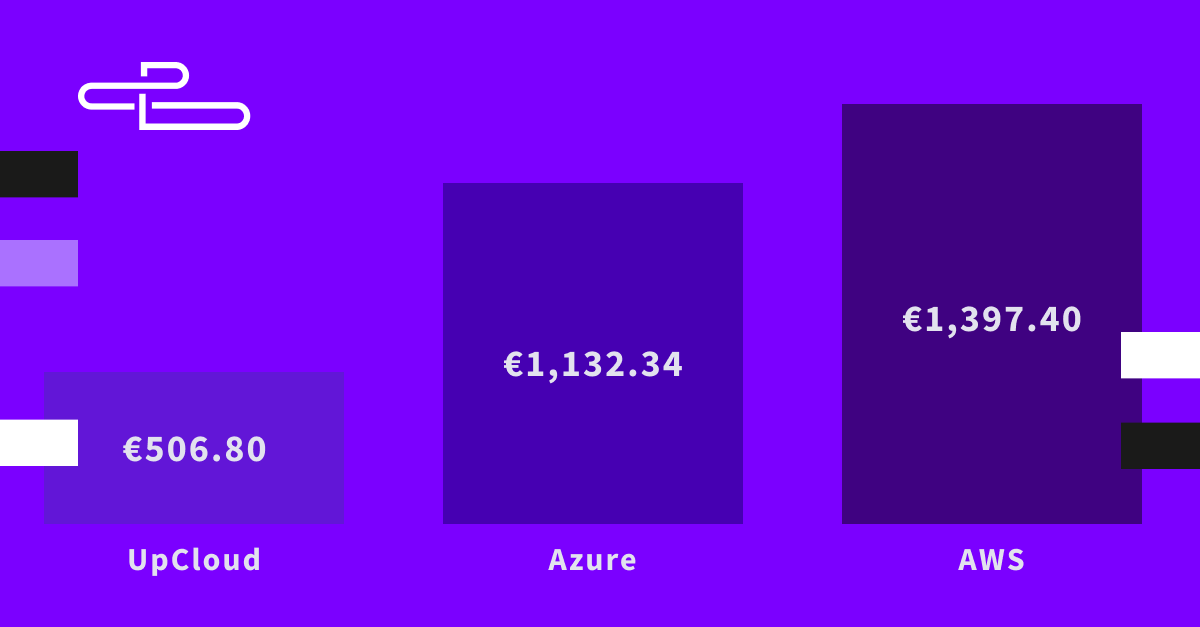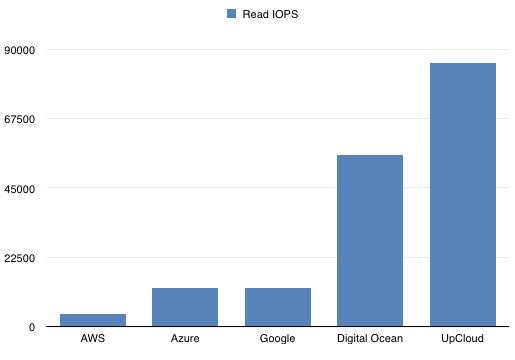Cost optimisation is the phrase on the lips of everyone in the tech world at the moment and we can see why.
For businesses who run mission-critical services on the Cloud, cost optimisation is an important exercise and one we would encourage everyone to think about.
But if your business is beginning to compare different Cloud service providers, we know it can be hard to figure out exactly what your needs are.
Not only are there an array of different options, but European businesses also have to factor in GDPR-compliant Cloud service providers as well.
At UpCloud, we’re all about putting ourselves to the test against other Cloud providers in the market, so we thought we’d run our pricing up against the two very typical choices; Amazon Web Services (AWS) and Microsoft Azure.
Below, you’ll see our Cloud provider comparisons which we’ve based on a number of factors, including total overall cost and GDPR-compliant data storage location, in this case, Frankfurt.
We know that Cloud provider comparisons are only useful when you balance like for like, and so we’ve taken the time to create a number of different Cloud infrastructure options depending on the size of your business.
As our colleague Erik Rehn said recently – this may be the time to cut costs, but it certainly isn’t the time to cut performance.
That’s why UpCloud offers one of the most robust cloud networks on the market, with a 100% uptime service level agreement (SLA), and technical support that, on average, responds to issues within 90 seconds.
We know that we punch above our weight in terms of performance and reliability. But we also believe that switching to UpCloud can help businesses optimise their costs by paying only for the services they need – not added extras they never use.
We encourage businesses to think holistically about their Cloud computing needs, looking beyond raw server costs to the total cost of ownership. Companies need to look at their entire Cloud infrastructure to understand what their overall costs will be.
But we also encourage you not to take our word for it! So don’t forget to check out our methodology below. We’ve only taken publicly available data, and linked directly to where you can find it so you can see for yourself when you go to compare different Cloud service providers.
Results
No matter whether you run a small, medium or large business, we’re confident that you’ll find this comparison useful.
Small
We’ve chosen this setup to show the cost of a Cloud server for small businesses, possibly a startup setting up its infrastructure to serve its first customers.
This represents a great starting point that can scale with the company as it grows.
This setup includes a load balancing service, a managed database, 100GB of block storage, two worker nodes and standby nodes with a seven-day backup for block storage to ensure 100% uptime.
Option 1 includes 1TB of outgoing traffic and uses the standard default IOPS on block storage across AWS and Azure. Option 2, meanwhile, includes 5TB of outgoing traffic across all platforms and factors in block storage tiers comparable to UpCloud’s proprietary MaxIOPs.
Medium
We’ve chosen this setup for a medium-sized company serving a number of customers through an online application.
This example infrastructure again includes a managed load balancing service for up to 10 TB of traffic per month, a managed database with 500 GB of block storage and eight worker nodes with seven-day backup for block storage and standby nodes.
Option 1 includes 5TB of outgoing traffic and uses the standard default IOPS on block storage across AWS and Azure. Option 2, meanwhile, includes 15TB of outgoing traffic across all platforms and factors in block storage tiers comparable to UpCloud’s proprietary MaxIOPs.
Large
We’ve chosen this setup for a large business serving its customers through an online application.
This time we’ve again included a managed load balancing service for up to 10TB of traffic per month, a managed database with 1TB of block storage and 24 worker nodes with seven-day backup for block storage and standby nodes.
Option 1 includes 15TB of outgoing traffic and uses the standard default IOPS on block storage across AWS and Azure. Option 2, meanwhile, includes 30TB of outgoing traffic across all platforms and factors in block storage tiers comparable to UpCloud’s proprietary MaxIOPs.
Extra large
This is an example of a use case for an enterprise-level company that serves a significant number of customers through a data-heavy application every month.
To illustrate the needs of a company this size, we’ve included two managed load balancing services, both for up to 10TB of traffic per month, two managed databases with 8TB of block storage and 72 worker nodes with seven-day backup for block storage and standby nodes.
Option 1 includes 30TB of outgoing traffic and uses the standard default IOPS on block storage across AWS and Azure. Option 2, meanwhile, includes 60TB of outgoing traffic across all platforms and factors in block storage tiers comparable to UpCloud’s proprietary MaxIOPs.
Methodology
These particular setups represent a typical cloud infrastructure we’re seeing customers build in 2023, which is why we chose them. Naturally, costs will depend on the specific scenario that your business requires.
No matter the size of your business, however, you will want to utilise modern tooling and best practices, which we believe are factored into each of the scenarios above.
Each of the different illustrations includes GDPR-compliant Cloud storage, hosted on our European servers, and compares similar AWS and Azure services compliant with GDPR storage requirements.
Prices are all taken from publicly available sources and are correct as of 19th May 2023. Each comparison assumes central EU location service prices and does not include any discount or offers for any provider, including UpCloud.
You can calculate your own prices for AWS on its website and for Azure on its website here.
To learn more about how you can grow your business using UpCloud Services, take advantage of our unrivalled customer support and book a call with one of our team members today!

